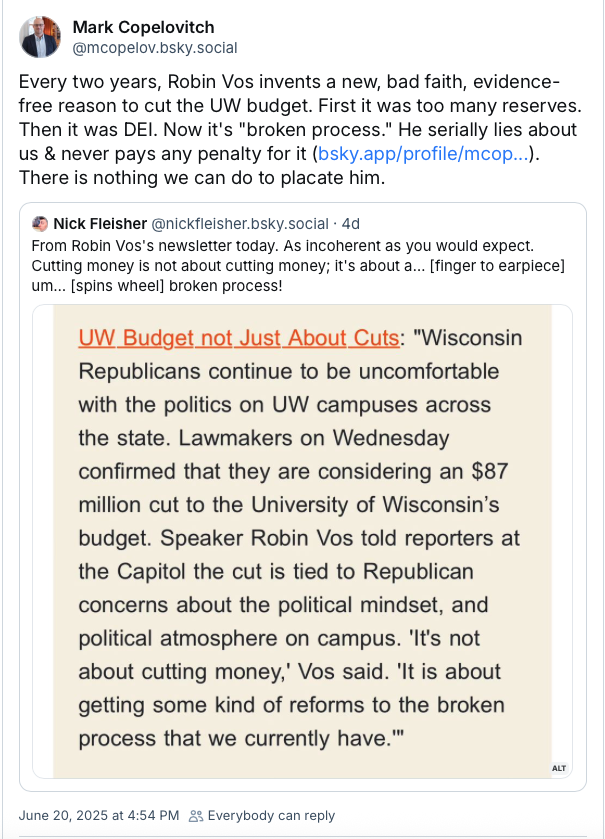Good morning.

Thursday in Whitewater will be sunny with a high of 88. Sunrise is 5:21 and sunset is 8:36, for 15 hours, 15 minutes of daytime. The moon is a waxing gibbous with 57.5 percent of its visible disk illuminated.
On this day in 1863, the final day of the Battle of Gettysburg culminates in Confederate defeat following Pickett’s disastrous charge.
Whitewater’s Independence Holiday celebration begins today at the Cravath Lakefront:
Christman Family Amusements Wrist Band Session: 5-9 PM, $25 each wrist band
Family Day Sponsored by Generac 4-7 PM
Karaoke at Frawley Ampitheater: 4-6 PM
Miss Whitewater Pageant at Frawley Ampitheater: 6:30 PM
Civic Organization Food Vendors: 4-11 PM
There’s a new state budget, despite grumbling about the terms from many Democrats and some Republicans. I’m neither a Democrat nor a Republican (nor of any political party), and perhaps that makes it easier to discern insightful reporting from the stenography of posturing and whining. Fortunately, Anya van Wagtendonk accurately reports on the underlying WISGOP weakness that Gov. Evers exploited:
That speed [in adopting a budget] was motivated by a deadline out of Washington, as Congress works to pass President Donald Trump’s signature “Big Beautiful” budget bill before a self-imposed July 4 deadline. That far-reaching tax and immigration legislation includes massive cuts to Medicaid, including a cap on how much money states can request from the federal government through hospital assessment fees.
The Wisconsin state budget passed Wednesday night raises its assessment fee to the maximum amount. By passing the budget before the Trump bill is signed into law, Wisconsin lawmakers dodged the new cap.
Earlier in the day, Assembly Speaker Vos said legislative Republicans and Evers’ office were aligned in trying to pass the budget quickly for that reason.
“We all understand that once the signature goes on at the federal level, it really limits the options for us to capture that federal revenue,” he said. “I think that’s one area we found pretty widespread agreement.”
As he signed the bill into law early Thursday morning — a contrast to past budget cycles, when he has acted days after passage, during the day and often flanked by kids — Evers referred to the truncated timeline, too.
“We want our health care system to be in good shape, and in order to do that, we’re going to need help from the federal government, and whatever we can do before they pass through … the federal budget, we will be able to access help from them to keep our hospitals afloat,” he said. “It’s absolutely critical for us to do that.”
(Emphasis added.)
See Anya van Wagtendonk, In wee hours, Legislature passes and Evers signs 2-year, $111-billion state budget, Wisconsin Public Radio, July 3, 2025.
That’s it: national Republican policy made state Republicans vulnerable to a looming deadline (a vulnerability that Evers exploited with dispatch). Vos was weak, not strong or ‘bipartisan’; Evers shrewdly exploited that weakness.
In Whitewater, the city’s declining and aged special interests look to Vos as patron and exemplar. In this, their judgment is weak and their prospects poor.
Sierra Nevada red fox spotted on camera in California’s Lassen Volcanic National Park:


